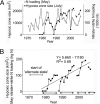Colloquium paper: ecological extinction and evolution in the brave new ocean
- PMID: 18695220
- PMCID: PMC2556419
- DOI: 10.1073/pnas.0802812105
Colloquium paper: ecological extinction and evolution in the brave new ocean
Abstract
The great mass extinctions of the fossil record were a major creative force that provided entirely new kinds of opportunities for the subsequent explosive evolution and diversification of surviving clades. Today, the synergistic effects of human impacts are laying the groundwork for a comparably great Anthropocene mass extinction in the oceans with unknown ecological and evolutionary consequences. Synergistic effects of habitat destruction, overfishing, introduced species, warming, acidification, toxins, and massive runoff of nutrients are transforming once complex ecosystems like coral reefs and kelp forests into monotonous level bottoms, transforming clear and productive coastal seas into anoxic dead zones, and transforming complex food webs topped by big animals into simplified, microbially dominated ecosystems with boom and bust cycles of toxic dinoflagellate blooms, jellyfish, and disease. Rates of change are increasingly fast and nonlinear with sudden phase shifts to novel alternative community states. We can only guess at the kinds of organisms that will benefit from this mayhem that is radically altering the selective seascape far beyond the consequences of fishing or warming alone. The prospects are especially bleak for animals and plants compared with metabolically flexible microbes and algae. Halting and ultimately reversing these trends will require rapid and fundamental changes in fisheries, agricultural practice, and the emissions of greenhouse gases on a global scale.
Conflict of interest statement
This paper results from the Arthur M. Sackler Colloquium of the National Academy of Sciences, “In the Light of Evolution II: Biodiversity and Extinction,” held December 6–8, 2007, at the Arnold and Mabel Beckman Center of the National Academies of Sciences and Engineering in Irvine, CA. The complete program and audio files of most presentations are available on the NAS web site at
The author declares no conflict of interest.
Figures



Similar articles
-
The future of the oceans past.Philos Trans R Soc Lond B Biol Sci. 2010 Nov 27;365(1558):3765-78. doi: 10.1098/rstb.2010.0278. Philos Trans R Soc Lond B Biol Sci. 2010. PMID: 20980323 Free PMC article.
-
Hydroids (Cnidaria, Hydrozoa) from Mauritanian Coral Mounds.Zootaxa. 2020 Nov 16;4878(3):zootaxa.4878.3.2. doi: 10.11646/zootaxa.4878.3.2. Zootaxa. 2020. PMID: 33311142
-
Marine Metazoan Modern Mass Extinction: Improving Predictions by Integrating Fossil, Modern, and Physiological Data.Ann Rev Mar Sci. 2019 Jan 3;11:369-390. doi: 10.1146/annurev-marine-010318-095106. Epub 2018 Sep 14. Ann Rev Mar Sci. 2019. PMID: 30216738 Review.
-
Extinctions in ancient and modern seas.Trends Ecol Evol. 2012 Nov;27(11):608-17. doi: 10.1016/j.tree.2012.07.010. Epub 2012 Aug 10. Trends Ecol Evol. 2012. PMID: 22889500 Review.
-
Vertebrate evolution. Evolutionary innovation and ecology in marine tetrapods from the Triassic to the Anthropocene.Science. 2015 Apr 17;348(6232):aaa3716. doi: 10.1126/science.aaa3716. Science. 2015. PMID: 25883362 Review.
Cited by
-
Insights into Blue Whale (Balaenoptera musculus L.) Population Movements in the Galapagos Archipelago and Southeast Pacific.Animals (Basel). 2024 Sep 18;14(18):2707. doi: 10.3390/ani14182707. Animals (Basel). 2024. PMID: 39335296 Free PMC article.
-
Marine mammals as indicators of Anthropocene Ocean Health.NPJ Biodivers. 2024 Sep 10;3(1):24. doi: 10.1038/s44185-024-00055-5. NPJ Biodivers. 2024. PMID: 39256530 Free PMC article. Review.
-
Decline of a distinct coral reef holobiont community under ocean acidification.Microbiome. 2024 Apr 17;12(1):75. doi: 10.1186/s40168-023-01683-y. Microbiome. 2024. PMID: 38627822 Free PMC article.
-
Net benefit of smaller human populations to environmental integrity and individual health and wellbeing.Front Public Health. 2024 Mar 5;12:1339933. doi: 10.3389/fpubh.2024.1339933. eCollection 2024. Front Public Health. 2024. PMID: 38504675 Free PMC article. Review.
-
Warming waters lead to increased habitat suitability for juvenile bull sharks (Carcharhinus leucas).Sci Rep. 2024 Mar 14;14(1):4100. doi: 10.1038/s41598-024-54573-0. Sci Rep. 2024. PMID: 38485970 Free PMC article.
References
-
- Pauly D, Christensen V, Dalsgaard J, Froese R, Torres F., Jr Fishing down marine food webs. Science. 1998;279:860–863. - PubMed
-
- Jackson JBC, et al. Historical overfishing and the recent collapse of coastal ecosystems. Science. 2001;293:629–638. - PubMed
-
- Christensen V, et al. Hundred-year decline of North Atlantic predatory fishes. Fish Fisheries. 2003;4:1–24.
-
- Myers RA, Worm B. Rapid worldwide depletion of predatory fish communities. Nature. 2003;423:280–283. - PubMed
-
- NRC. Dynamic Changes in Marine Ecosystems: Fishing, Food Webs, and Future Options. Washington, DC: Natl Acad Press; 2006.
MeSH terms
Substances
LinkOut - more resources
Full Text Sources
Other Literature Sources


